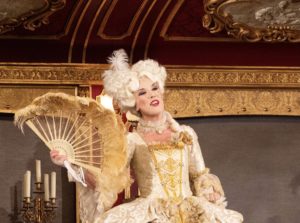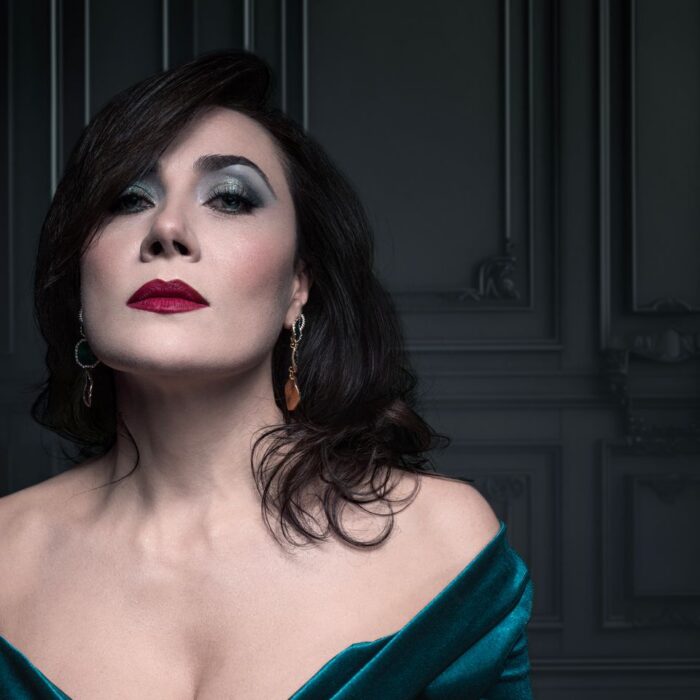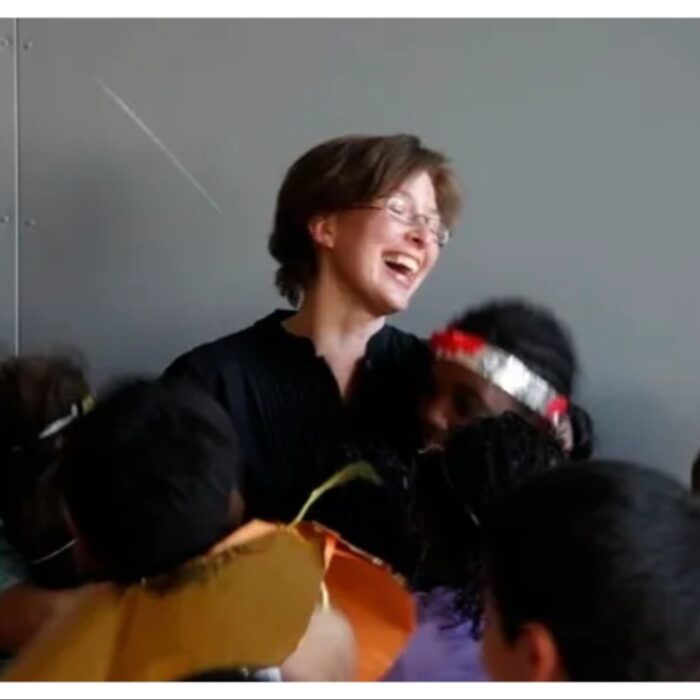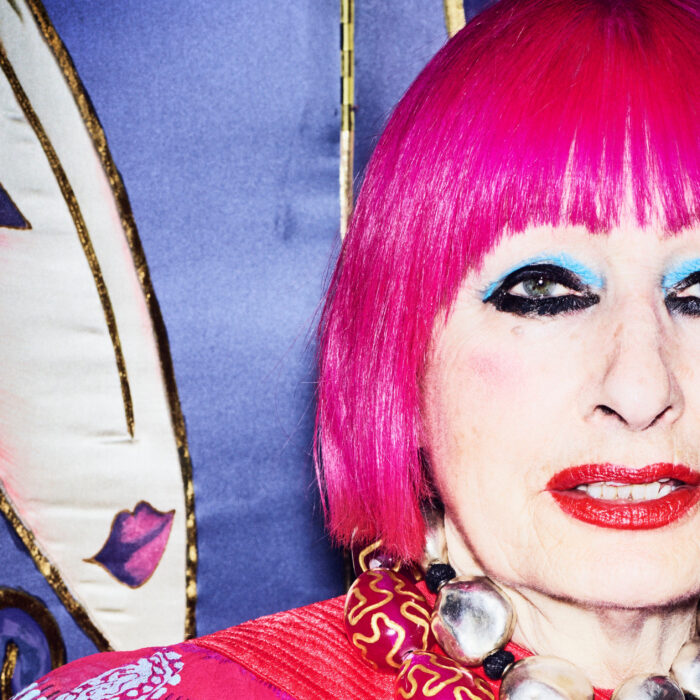
Q & A: Contralto Alessandra Visentin On Her Blossoming Career and Her Forthcoming Recording Of Respighi Rarities
By Alan Neilson(Photo: Brescia/Amisano)
Italian contralto Alessandra Visentin is a singer who tends to operate below the radar.
Athough rarely in the headlines, she is a singer who is forging a very successful career. She performs in major opera houses, and has just recently released her first solo recording “Per la Signora Geltruda,” a CD of works by Vivaldi.
Anyone who has heard her sing will surely have been struck by her distinctive seductive voice, with its warm, rich timbre, capable of drawing the listener into the emotional depths of her interpretations. In 2020, playing the part of the Ozias, in Vivaldi’s “Juditha Triumphans” in a production at Vicenza in Lirica, OperaWire commented on her “dark, sensuous voice suggestive of the deep mysterious truths possessed by the priestess.” It is praise to which she is no stranger, as she is consistently lauded by critics for her performances.
Although she considers herself to be a baroque specialist, she is happy performing roles from any period, and is particularly fond of contemporary opera. She enjoys performing operas and oratorios, but is also drawn to chamber music. In essence, she is a singer who simply loves to make music.
Next month she will be off to New York to record a disk of works by Respighi on the Naxos label, so OperaWire thought it an ideal time for an interview, to find out more about her career, her plans and the forthcoming recording. What emerged was a story of a deeply sensitive musician, dedicated to music and music-making.
OperaWire: What is your background and what made you decide to become an opera singer?
Alessandra Visentin: Music has always been an important part of my life, I see myself as a musician first, and as a singer second. I started with the piano when I was a child, and although I am not a professional pianist, I think I am quite good, and it is something which is still very important to me. It also helps me when I am studying with my singing. Even before I became interested in my own voice I was very interested in making music with other people. I played in duos or trios, and I loved playing the piano with four hands with a friend of mine.
My father and my grandfather both loved opera so I used to go to the theatre regularly, and as we come from the Veneto region of Italy, we often went to Venice’s La Fenice and the Arena in Verona. My father really liked tenors, and so I grew up listening to the great tenors like Domingo and Pavarotti.
I first started singing one Christmas when the chorus master in my church Gildo Tessari needed people to help out because many choristers were ill, and I found it was something I really enjoyed. He told me I had a very particular, interesting, low voice and encouraged me to continue, and so started to take proper lessons. Part of this decision was because I am a very curious person, and I wanted to understand how to sing, and how I could use my voice.
After about two years, my first teacher Marina Bottacin suggested I should become a professional opera singer. This was the point at which I started to consider a career as a professional singer. I enrolled at the conservatory in Milan, and things progressed from there. I won a competition for the Accademia del Maggio Musicale in Florence and studied there for two years. It was here that Zubin Mehta gave me my first big opportunity, as a soloist in Beethoven’s 9th symphony. Things then progressed from there.
OW: Who do you consider to be your biggest influences?
AV: My teachers, Sara Mingardo and Bernadette Manca di Nissa really inspired me, and together they helped my passion for music grow. They made me understand that I am part of an orchestra, that I am just one of many instruments, and that I am making music with other people. That it is not just me! Sometimes I hear singers and I know they are thinking just about their own voice. That is not enough for me.
Obviously, my family, particularly my father, also had a major influence. He is now very happy that I am an opera singer and comes to see my performances when he can, but he is super critical, especially at the beginning of my career. However, it is something I really appreciate, he has helped me a lot, he always tells me the truth. He has always wanted me to improve, and to succeed.
Then there are the great singers of the past. I love listening to Christa Ludwig, especially to her when she is singing chamber music. Also I find Kathleen Ferrier’s voice is very interesting, it is very particular.
OW: How would you describe your voice?
AV: I think knowing your own voice is one of the most difficult things to understand. I would describe it is a warm voice with low, colorful tonalities, a voice which embraces the listener. I also believe it reflects who I am as a person. It is easy for me to sing in the low and middle registers, but I also work on the upper register because I need it at times.
OW: Have you been happy with how your career has progressed so far?
AV: From 2008 I have sung frequently in theaters across Italy, including Bologna, Florence, Ravenna, Piacenza and Macerata. I have also had many opportunities to sing abroad, and I particularly enjoyed singing in Bach’s St. john’s Passion in Vienna’s Goldener Saal Musikverein, in Paisiello’s Mass at the Salzburg Festival with Riccardo Muti and Juditha Triumphans at the Theatre des Champs Elysèes in Paris. More recently I have debuted at La Scala; I auditioned with Maestro Chailly singing some pieces by Bach, but he identified something in my voice he wanted to use in Puccini, so he cast me in both “La Fanciulla del West” and “Manon Lescaut.” Just before the pandemic I made my debut as Suzuki at Naples’ San Carlo in a production by Ferzan Ozpetek.
So yes, I feel my career is developing well.
OW: How has COVID affected your career?
AV: Like most singers I suffered a lot of cancellations. For example, in 2020 I signed a contract with San Carlo which didn’t go ahead, and the proposed recording for the Resphigi Project was postponed three times. Many of my concert engagements were cancelled. It wasn’t good.
On the other hand, I was also lucky. During the first summer I worked at Vicenza in Lirica singing with Sara Mingardo and Vivica Genaux and at the International Festival MiTo where I sang chamber music, which I really loved doing. Then the same thing happened the following summer. It was all very interesting.
The effects of the Covid restrictions have been far worse for younger singers as they have missed out on the experience which is so important at the start of a career.
OW: You seem to sing across the board, from Monteverdi and Vivaldi to Puccini and Respighi. Do you have a preferred composer or period?
AV: I love making music, and I sing what I can, but of course, I cant sing everything and have to make decisions. My primary repertoire has been Vivaldi, Händel and Bach, and the baroque in general, while I reserved the 19th century operas for secondary roles.
I don’t think that I have changed my focus over the years, but I have broadened my repertoire with more chamber music and more contemporary opera, which actually is not so far from the baroque repertoire. With baroque music the voice is seen as an instrument, and contemporary composers have the same approach. They often ask for baroque singers to perform their works, and I have sung many contemporary works for this reason. The opportunity to sing contemporary music relies a lot on your relationship with the composer. If they like your voice then you get opportunities.
Maestro Salvatore Di Vittorio for example last year composed a cycle called “Arie for Enea” and wants me to sing in the premier.
OW: Maestro Di Vittorio is in charge of the The Respighi Project. How did you become involved?
AV: I met Maestro Di Vittorio in New York five years ago. I was at a concert in Carnegie Hall and we had a conversation, and he asked me to send him some videos and recordings. After a couple of weeks he emailed me and told me that I had a very interesting voice and would be perfect for a project that he was working on. A year later he contacted me again and explained the project, and asked me if I was interested. Of course I was! It is a great opportunity, especially as there is so few opportunities in Italy to sing chamber music.
Maestro Di Vittorio was asked by the Respighi family to restore and finish some of his work. He restored his version of Monteverdi’s “Arianna’s Lament,” and completed the orchestration for “Tre liriche” – “La notte,” “La nebbia” and “La pioggia.” So now the plan is to record them on the Naxos label. His “Tramonto” and “Aretusa” may also be added to the disk as there have not been many recordings of these pieces. The recording is due to go ahead this April.
OW: What are the challenges in preparing for the CD?
AV: I need to think about the quality of the sound and especially the dynamics I want to use. I will be singing with a large chamber orchestra. Normally, when you sing chamber music it is with a small ensemble or a piano. I will be telling a story with my voice, there is no acting and I must explain the feelings through the voice. I create this, and the audience understands what I am doing and why, but with a big orchestra the context is completely different. I still need to create the same atmosphere, I am still telling the same story, but I have to take different decisions to achieve this. I wont change the way I sing, but I need to consider the how to present the pieces. This is definitely the main challenge.
OW: This will not be your first solo recording. You recently released a disk of works by Vivaldi, didn’t you?
AV: Yes, during the pandemic in March 2020. The disk called “Per La Signora Geltruda” on the Pan Classics label, on which I sung works by Vivaldi, including “Stabat Mater” and some motets. The name of the CD comes from Vivaldi’s note on the “Clarae stellae scintillate” manuscript, a piece included on the CD. Signora Geltruda is the name of the singer for whom he wrote the work. She was one of the girls who sang in the choir and as a soloist at the Pietà, where Vivaldi taught. Normally, he didn’t write anything like this on the score, so it is somewhat unusual.
We had series of concerts planned to promote the CD with the conductor Luca Oberti, but they were cancelled because of the Covid pandemic, and so I lost the opportunity to sing it in front of the public.
OW: Will you be doing a tour to coincide with the release of the new CD?
AV: At the end of the Respighi recording session we will have a sort of promo concert at the Di Menna Center for Classical Music in New York in which we will present some of the works from the recording. We will also be doing a concert at Carnegie Hall to coincide with its release, which will probably happen the following year, but the date has yet to be finalized.
The most important thing now, however, is to finish the recording. After three postponements due to covid, you start to worry that it may not happen.
OW: Do you prefer singing in the concert hall or in a theater?
AV: I like both. What you discover from one form can be used in the other. They inform each other. So every time I do something on the stage I learn something I can use in the concert hall.
Normally, I do a several theatre productions a year and it becomes part of my life, but then I miss the intimacy of performing chamber music. For singers who don’t do much chamber music maybe it is not a problem, but for me it is different, I need to do both. It is very interesting for me when you can add something new, taken from the concert hall and put it into a theatrical production and vice-versa.
OW: How would you like your future to develop?
AV: I want to continue from where I left off before the pandemic began. I was in a very happy situation at that point. My career was going well and I was doing many interesting performances and new roles. I had many opportunities, and I just hope I can return to this situation.
If there is one work that I would love to perform it is Brahm’s “Contralto Rhapsody.” I want to do it at least once during my lifetime. I love it so much. I have studied it for many years. It really is one of my dreams.
As for a venue, I was born very close to Venice and yet I have never performed at La Fenice. I would love to sing there one day



